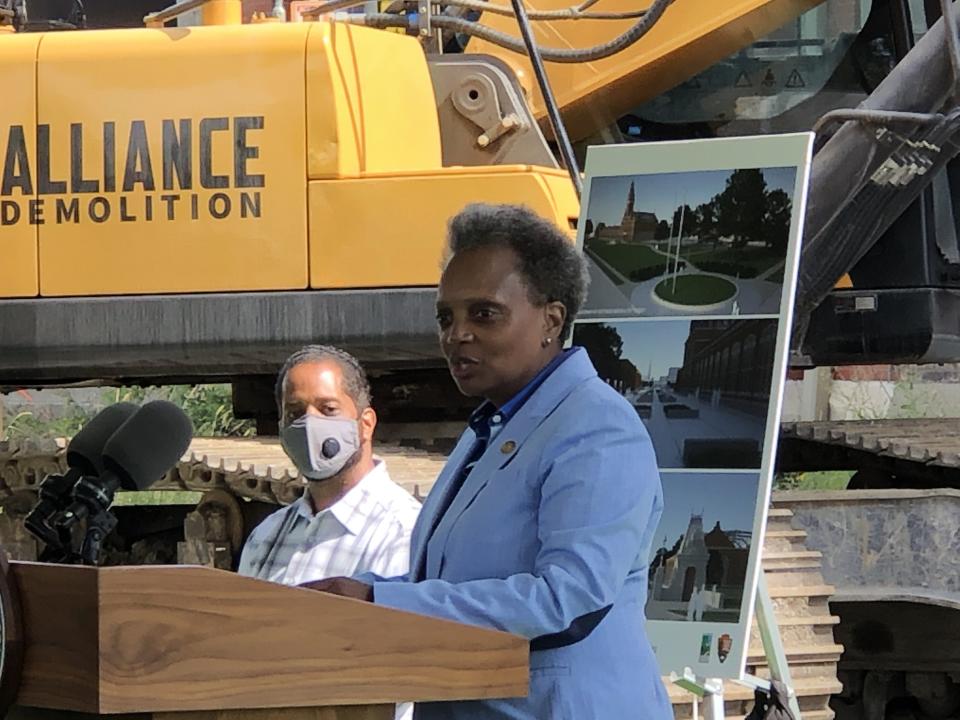Mayor Lightfoot, Rival Ald. Beale Didn't Throw Dirt At Each Other
CHICAGO — Standing side-by-side with shovels filled with soil, neither Mayor Lori Lightfoot nor Ald. Anthony Beale threw dirt at each other.
The bitter political rivals even acknowledged each other's existence with an elbow-bump at a ceremonial groundbreaking at the Pullman National Monument on Monday.
It's no secret they don't like each other. Beale was one of Lightfoot's early supporters, and quickly fell out of favor with the mayor. Back in January, I wrote of my worry that their simmering feud might stand in the way of Amazon building a new distribution center in my neighborhood.
Thankfully, the Amazon deal got done. But the rift between my ward boss and the mayor only got worse as the city descended into chaos caused by coronavirus and civil unrest.
Beale regularly publicly criticizes the mayor's handling of, well, almost everything. And Lightfoot dismisses the 9th Ward alderman by saying he's prone to grandstanding to get media attention.
At last month's special City Council meeting —called by Beale and a collection of Lightfoot foes who want National Guard protection in Chicago — the 9th Ward boss declared, "This is not a dictatorship."
When I asked if maybe she could bury the hatchet with Beale and the others in a peace circle, Lightfoot laughed. But just last week, while announcing the city would face a $2 billion budget deficit over the next two years thanks to COVID-19, Lightfoot did an about-face. She called for changing the "tone of our discourse."
The mayor vowed to "push myself harder to work with people with whom I do not agree and who do not agree with me."
“If you are focused on creating a better tomorrow for all of our residents, then I will be even more intentional in finding common ground with you," Lightfoot said in her budget address.

For more than 20 years, Beale — one of those people with whom the mayor does not agree — has pushed to successfully revived my neighborhood, once a notorious food, jobs and shopping desert that's now home to indoor agriculture, manufacturing and distribution companies, a Walmart, and places to work out, get your nails done, shirts dry-cleaned and a bite to eat.
Earlier this year, Lightfoot included Pullman in her administration's signature redevelopment effort, Invest South/ West, which aims to revive business districts in poor minority communities long neglected by City Hall.
On Labor Day, Pullman seemed to be a place where Lightfoot tried to find common ground with Beale.
"As the alderman said, there is much work to do not only here in the 9th Ward but all over our city. And I look forward to being a part of that work, shoulder to shoulder with working men and women who deserve to have a decent life for them and their children," Lightfoot said.
"We know doing this work transforms communities, creates a sense of purpose and ownership in the ground under their feet, and that's what we must be about. That's why I'm glad to be here today. Thank you, alderman."
That sure seemed like unlikely mayoral olive branch to me. And, as I mentioned, they stood next to each other with shovels full of dirt and didn't heave any at each other. They even shared one last elbow bump before parting ways. But you never can tell with Chicago politicians.
So, I chased down the mayor before she got away to ask if what transpired was something like a peace circle. Lightfoot chuckled and said,"Time will tell," before climbing into her SUV.
I relayed the mayor's response to Beale, who for a few moments stared at me in what seemed to be a contemplative silence.
"I'm always hopeful because my community, we're doing a lot," Beale said. "We just want to continue to move forward without obstruction. We need all hands on deck if we're going to continue this ball rolling."
Time will tell.
Mark Konkol, recipient of the 2011 Pulitzer Prize for local reporting, wrote and produced the Peabody Award-winning series, "Time: The Kalief Browder Story." He was a producer, writer and narrator for the "Chicagoland" docu-series on CNN, and a consulting producer on the Showtime documentary, "16 Shots.
More from Mark Konkol:
Are Feds Sniffing CPS Custodial Contract To Make Insiders Squirm?
CTU Bosses Demanding Hazard Pay For Teachers In Empty Classrooms
If Foxx Lied To Public She Represents, Take Away Her Law License
Lightfoot Stands Alone, Talks Like 'Boss' She Doesn't Want To Be
Who's To Blame For Chaos In Chicago? Fingers Point At Everyone
Are CTU Bosses Backing Madigan Or Fighting For Social Justice?
This article originally appeared on the Chicago Patch

